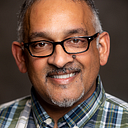Parts Unknown: Math Education Needs To Get A Passport and Start Traveling
I met Anthony Bourdain at a book signing in Toronto back in 2005. Already a renowned author and television celebrity then, he was wonderfully gracious with his time with me. If anything, I seemed to accelerate the conversation, needlessly wary of the 200 people waiting behind me. We talked about our mutual love of The Ramones and the now sadly defunct CBGB’s in New York. Those 90 seconds were enough to capture the personality I imagined and the graceful wisdom that would wash over his lasting legacy — Parts Unknown.
He is the person I have cited the most in all my writings regarding mathematics. The idea of deceased host of a travel show having the most influence on my views of math education has become less and less strange over the last year.
I spent about 15 minutes to choose a symbolic image for this article. There are hundreds of great photos from the 103 episodes of this 5 year show on CNN. I chose the one above because it perfectly captures where math education needs to be. One, smile and laugh with others when you are doing a math problem. People don’t gather around a table to read recipe books to each other. Doing a math problem/puzzle/conundrum with others for no other reason than the pure joy and beauty of mathematics is the equivalent of breaking bread and drinking beer.
And, try a math problem that you have no idea where to start, and learn something about that problem(“its customs”) that can help you learn something new about yourself. Sure, the problem could be completely foreign to you, but don’t we want our students and teachers to be risk-takers, adventure-seekers, and curious mathematical travelers.
Don’t we want that for ourselves? There should also be times where we sit quietly and independently with a problem, savoring it for ourselves. The flavors aren’t coming from the solution; they are coming from question and the mystery of the unknown thinking that lies ahead.
The secret ingredients to mathematics is simply thinking about mathematics.
If you follow Bourdain’s two-decade journey in writing/television, you can easily see he went from talking about himself and the food to listening to others because of food. But, even with his first show, A Cook’s Tour, he had message for his audience about looking for new emotions and experiences…
Doing the same old mathematics in the same old ways doesn’t lead us to the edges — where we feel alive — where we need to take all our students to where these new emotions and experiences exist. You can even see something like the meditative and reflective quality of traveling begin to have a huge impact on him navigating himself to find humanity through the stories of others — not him. Listening to our students and their identity with mathematics — the good, bad, and the ugly — is the symbolic essence of Parts Unknown.
Mathematics can be tranquil and meditative. It’s just not that in schools.
The way that mathematics has been historically taught is through a practical lens of almost ritualistic duty. More akin to a trip to the grocery or hardware store — necessary demands of suburban life.
That’s not mathematics. That’s the domesticated version of it. Mathematics is a bloody adventure. Hoist the sails, and away we go!
Food is more necessary to life than mathematics. For some, unfortunately, food is something not easily to come by, and you make do with whatever you have. But, Bourdain never let that interfere with his explorations, especially of meeting new people and learning from them. He sat with anyone from anywhere if there was a story for him to…listen to.
There were no luxury resorts, manicured beaches, or fancy restaurants in Parts Unknown. It was just a simple cocktail of intriguing food and intriguing people. Mathematics enjoys the same simplicity. Here is an interesting problem, tell me what you think. Tasty? Yes? No? Bourdain sat with people from all different races, cultures, and socio-economic conditions. He got out of the way, and just let them tell their stories.
We are in the throes of a much needed mathematical revolution revolving around play and equity. Let’s give rich mathematical problems/ideas to all our students, and get out of their way as well. Our “interference”, all with good intentions of being a teacher, comes from the pressure of expectations, checkpoints, performance, and testing. In our current climate of anxiety, apprehension, and doubt over how/when we can return to normal after this pandemic, we need to unchain ourselves — hopefully forever — from these dehumanizing obstacles to the joyful mathematical experience all of us deserve.
Discovering new mathematics with others in settings that are disarming and convivial is going to be so important in the future. Food and travel, as wonderful as they are, became required conduits for Bourdain to find the humanness that he craved in the end. Math education would be wise to follow the trail that Anthony Bourdain left for all of us. The currency of that which was fully appreciated the day he died.
His life has been tattooed to mine and millions others. In the end, he left us with so many wonderful memories of laughter and connection. Maybe that is where we will find the human terminus of math education.
In parts unknown.
